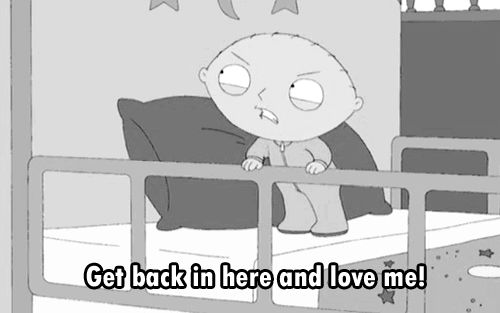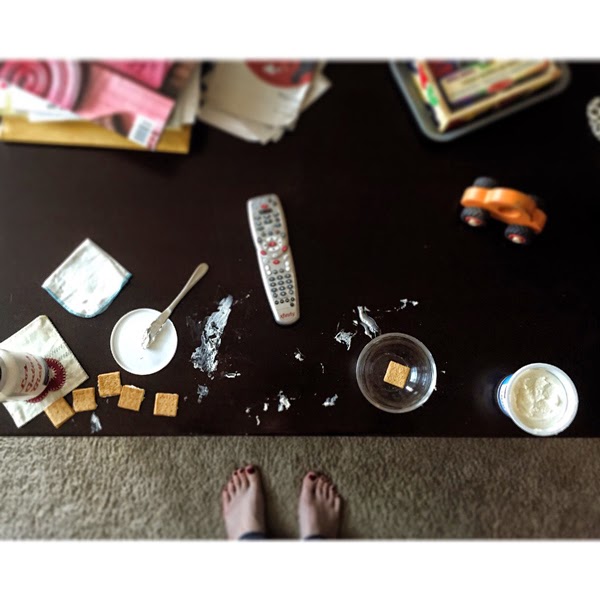 |
| Sharing the magnifying glass to inspect their new friend, Caterpilly. |
Chapter 6, entitled Why Can't They Just Share? Why Kids Fight Over Possessions, is pretty short and concise. The gist is this: the views most parents have on sharing are flat-out wrong. They aren't actually fair and they don't work in real life. My own example: Kid A is playing with a light-up laptop, making things flash and making his own music and giggling and dancing. Kid Rock wants to play with the laptop because it looks SO DANG FUN! Mama June says "oh, Kid A, Kid Rock wants to play with that. Why don't you let him play for a while?" She reaches in and slides to laptop over to Kid Rock. Or, in some cases, Kid Rock reaches over and grabs the laptop for himself and Mama June affirms this behavior with the same line as above. Now let's make the kids 15 years older. Kid A is working on a real laptop mixing his newest album and Kid Rock wants to make his own album. If Kid A were forced to stop working so Kid Rock could work, everyone would think Kid Rock was a giant asshole. In the real world, Kid Rock would have to wait until Kid A was finished or get his own damn laptop.
Play is the Serious Work of Childhood.
If we want to raise respectful humans, we need to start respecting them from their first breath.
Alternatives to interruption and disrespect?
"Hey, Kid A, when you get to a good stopping point, let Kid Rock have a go, ok? Thanks!"
"Hey Kid Rock, Kid A is playing with that right now, but when he's finished you can definitely have a turn. Promise." And if there are a lot of kids, you can add: "Let's start a list, so everyone gets a turn." If the kids get the concept of time, you could even set a timer so there's an even rotation.
 |
| Working together to build a new rocket toy. |
Dr. Markham recommends that everyone get a copy of It's Ok Not To Share and give it a good read. If you want a read-along for that, Amanda Morgan at Not Just Cute participated in one last year. She has some amazing insight. (And for the record, hers is one of my favorite blogs. I highly recommend it as a resource. Her First Friday Q&As are my favorite. Even if the topic isn't immediately relevant, there is always good information in her answers and resources.) Janet Lansbury is also a good resource for the topic of sharing. I especially like this one, as it has a very helpful video and explanation following it.
Chapter 6 leads nicely into Chapter 7: Easing the Competition.
This chapter addresses some things I just don't identify with (yet?): children feeling like you prefer the other(s) over them, you actually having those feelings, lots of competition and bickering, resentment, grudges, hurt feelings. Perhaps my children are still too young for these things - in fact, I'm almost certain they are and that one day in the not-too-distant future I'll have to help arbitrate resolutions.
The gist of the chapter is this: if you have conversations with your children wherein you explain your reasoning for your decisions, your children will understand. Maybe not immediately, and they most certainly won't always be happy, but they will understand. Making explanations and conversations a habit will help you to raise reasonable human beings who can function well in society.
Kids can come to "fair" decisions all on their own sometimes once they've had the groundwork laid. For example, my boys like to race around the apartment like caged animals and sometimes Walter, who is just not as fast as Baz gets upset that he can't keep up. The first time this happened, I sat them both down in the living room and said something to the effect of "Honeys, Walter is having a hard time keeping up and that's making him sad. His legs just aren't as long as yours (Baz) are and so it's harder for him. He has a shorter stride so he covers less distance." Baz responded with something like "Well, I like winning." And then we had a conversation about how your can't win all the time and really, in this situation it's not even about winning because that takes some of the fun out of it....and remember how when they kept freaking out because they would race to the front door and would sometimes not be first so I made them walk slowly with me instead of running and that was less fun...and if we couldn't find a solution for this, then I would put the kibosh on running in the apartment.
Baz, who enjoys the physics-heavy show Blaze and the Monster Machines, had a solution: If Walter gets a head start, then he can have a boost and build up momentum faster and they'll get to the other end of the apartment at the same time. His actual explanation was flawed, from a physics aspect, but the intent was awesome.
So if you give them the building blocks for reasoning, a world of conflict can be avoided. At least, until hormones and romance enter the picture. Then all rules go out the window.




















.gif)




























